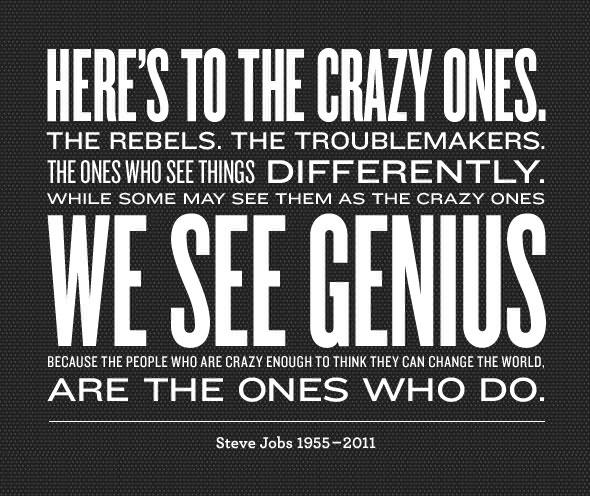Seven Ways to Practice Crazy Wisdom

“Crazy wisdom is the philosophical worldview that recommends swimming against the tide, cheerfully seizing the short end of the stick, embracing insecurity, honoring paradox, courting the unexpected, celebrating the unfamiliar, shunning orthodoxy, volunteering for tasks nobody else wants or dares to do, and breaking taboos in order to destroy their power. It’s the wisdom of those who turn the tables on despair by lampooning it, and who neither seek authority nor submit to it. To enlarge the soul, light up the brain, and liberate the spirit.” — Tom Robbins.
Do you ever feel like the little rebel inside you is being suppressed. Or that your inner revolutionary has been fooled into thinking that there’s no need for revolution. Or that your internal nonconformist has somehow conformed? Well, do not fear.
This article will be a breath of fresh air for each. It’s time to let your freak flag fly. Let your insurgent soul surge. Let your hidden ninja reveal itself in a puff of smoke. Don’t be serious, just be sincere. So without further ado, here are seven ways you can practice crazy wisdom.
1) Swim against the tide
“Don’t ask what the world needs. Ask what makes you come alive and go do it. Because what this world needs are people who have come alive.” — Howard Thurman.
Go against the norm. Toss a monkey wrench into the status quo machinery. Take the “monk” out of “monkey” and interrogate it to the nth degree. Watch it buckle and bend against your monkey holiness. Laugh with the whole of your heart, then shake it off and find another typicality to atypically topple with your own unique typology. Swimming against the tide takes courage, but the joy gained from the disruption, especially from disrupting obsolete or unhealthy social structures, is worth the effort.
It’s always worth the initial fear involved, and you’ll find that the more you practice going against the tide, the more you’ll be capable of transforming fear into courage.
2) Embrace insecurity
“We could never learn to be brave and patient, if there were only joy in the world.” — Helen Keller.
 Let yourself doubt. Let yourself crack open. The more you’re able to crack open, come back together, and then crack open again, the more you’ll be able to absorb the wisdom of the universe. Practice defensive pessimism, a phenomenon in which people imagine worst-case scenarios in order to manage their anxiety. There is wisdom in uncertainty that the certain will never ascertain.
Let yourself doubt. Let yourself crack open. The more you’re able to crack open, come back together, and then crack open again, the more you’ll be able to absorb the wisdom of the universe. Practice defensive pessimism, a phenomenon in which people imagine worst-case scenarios in order to manage their anxiety. There is wisdom in uncertainty that the certain will never ascertain.
Security is for the fearful. Don’t be fearful, be fearless. Dance with your insecurity like it was your first true love and it’s the last dance you’ll ever dance. Being honest with what makes us insecure counter-intuitively makes us more secure. Like David McRaney wrote, “You can’t improve the things you love if you never allow them to be imperfect.” And since we can never attain perfection anyway, there will always be the need to embrace insecurity and uncertainty.
3) Honor paradox
“The point of philosophy is to start with something so simple as not to seem worth stating, and to end with something so paradoxical that no one will believe it.” — Bertrand Russell.
We honor the paradox by giving it meaning, by being flexible and responsible with our own interpretation of it. At the end of the day, we are meaning-bringing creatures in an otherwise meaningless universe. It seems like semantic gymnastics, but it’s not. It really just comes down to the fact that we are perceiving an infinite reality using finite faculties. Because of this, paradox is inevitable. One of those paradoxes happens to be Meaning itself. Another one is Love. But what deliciously beautiful paradoxes they are. Reality itself is not a paradox, it is what it is. But Consciousness, and all the wonderful baggage that comes along with it, is a paradox. I would even go as far as to say: namaste, the paradox within me honors the paradox within you.
4) Court the unexpected
“Let go of certainty. The opposite isn’t uncertainty. It’s openness, curiosity and a willingness to embrace paradox, rather than choose up sides. The ultimate challenge is to accept ourselves exactly as we are, but never stop trying to learn and grow.” — Tony Schwartz.
Don’t suffer from the hell of expectation. Revel in the heaven of the unexpected instead. There’s a joy found in things not going according to plan that only those who don’t take things too seriously can feel. So don’t be self-serious. Be seized by the surprise. Be clutched by the beautiful crux of the cosmos. When your plans get dashed, roll with it, learn from it, be it, in the moment. Courting the unexpected is daring the universe to bewilder you.
It’s tempting the Great Mystery into a cosmic tango. You might not know the steps, but so what? You’ll either figure it out or make a fool of yourself. Both can be equally fruitful. So grab the unexpected by the hand and give her a twirl. And it wouldn’t hurt you to do a couple of pirouettes in her honor. Like Henry David Thoreau said, “None are so old as those who have outlived enthusiasm.”
5) Shun orthodoxy
“The priest is interested in the answers; the shaman is more interested in provoking you to ask the questions that will lead you into paradox and duality. The task of the shaman is not to pursue meaning but to create it, to bring the sacred to an otherwise profane and mundane reality. That takes a daily act of courage and a willingness to make mistakes.” — Alberto Villoldo.
 Slap with the truth all who claim to have achieved enlightenment. If they get angry or offended then they are not on the path toward enlightenment. If they shrug it off and laugh and say, “Oh well, there is always more to learn,” then they are on the path toward enlightenment, and they understand that enlightenment is always a journey and never a destination. Rather than live for a destination, live within a destiny. Shun all who claim to have all the answers, embrace those who ask sacred questions.
Slap with the truth all who claim to have achieved enlightenment. If they get angry or offended then they are not on the path toward enlightenment. If they shrug it off and laugh and say, “Oh well, there is always more to learn,” then they are on the path toward enlightenment, and they understand that enlightenment is always a journey and never a destination. Rather than live for a destination, live within a destiny. Shun all who claim to have all the answers, embrace those who ask sacred questions.
The orthodoxy is a blind ox burdened by the weight of parochialism and ancient “good” made uncouth by the spoils of time. It is facile and cursory, at best. Stiff-arm it into the corner. Or, better yet, transform it into something profound by questioning it to the nth degree, mixing it up into mulch, and then watching it blossom into something beautiful, like when a flower blossoms from the muck and mire of manure.
6) Volunteer for tasks nobody else dares to do
“There are two kinds of suffering. There is the suffering you run away from, which follows you everywhere. And there is the suffering you face directly, and so become free.” — Ajahn Chah.
Imagine all the tasks that people are afraid of doing for fear of seeming crazy. Then narrow those tasks down to the most important, whatever they might be, preferably the ones that make your heart sing, and then go do them. Be proactive. Be the spark in the dried up kindling of the status quo, then fan the flames. Be the catalyst in their cauldron of catatonia, then stir the pot. Inform the uninformed. Forgive the unforgiven. Help the helpless.
Unroost all chickens that have come home to roost. No fear, just sincerity. Dive right into being an amoral agent within any immoral system and you may be surprised at how quickly it moralizes itself. As long as your volunteer work comes from a place of healthy intent then it will always be a sacred act.
7) Break taboos in order to destroy their power
“But I don’t want comfort. I want God. I want poetry. I want real danger. I want freedom. I want goodness. I want sin.” — Aldous Huxley.
 Falling can be a sacred way of moving, if you allow it to be. Similarly, knocking people off pedestals and high-horses can be a sacred way of moving. When we can break taboos with joyous irreverence and gleeful derision, with healthy mockery and sincere ridicule, we free ourselves up to galvanize the world and help it to grow wings that can break through any perceived ceilings. Break rules, especially bad ones. Shatter systems, especially outdated ones. Rewrite doctrines, especially dogmatic ones.
Falling can be a sacred way of moving, if you allow it to be. Similarly, knocking people off pedestals and high-horses can be a sacred way of moving. When we can break taboos with joyous irreverence and gleeful derision, with healthy mockery and sincere ridicule, we free ourselves up to galvanize the world and help it to grow wings that can break through any perceived ceilings. Break rules, especially bad ones. Shatter systems, especially outdated ones. Rewrite doctrines, especially dogmatic ones.
Tear down rubrics, especially entrenched ones. Like William Wallace said in Braveheart, “People don’t follow titles, they follow courage.” Follow courage and you’ll almost always end up with a healthier disposition. And even if you don’t, at least you had an adventure. At least your life wasn’t just a law-abiding, rule-governing, title-honoring, order-obliging, boring waste of time that kept you a slave to an outdated system and only benefited the powers-that-be. Screw the powers-that-be, and their tertiary taboos. Take the power back by having the courage to challenge their outdated rules. The next generation will thank you for it.
Gary ‘Z’ McGee, a former Navy Intelligence Specialist turned philosopher, is the author of Birthday Suit of God and The Looking Glass Man. His works are inspired by the great philosophers of the ages and his wide awake view of the modern world.
Digital discoveries
- Migliori Casino Online
- Casino Non AAMS
- Siti Casino
- Sites De Paris Sportifs Belgique
- Tous Les Sites De Paris Sportifs Belgique
- Meilleur Casino En Ligne Belgique
- Casino En Ligne Belgique Bonus
- I Migliori Casino Online
- Non Aams Casino
- Scommesse Italia App
- Migliori Casino Online Esteri
- Paris Sportif Crypto Sans Kyc
- Site De Paris Sportif
- Sweet Bonanza Avis
- Paris Sportif Ufc
- オンラインカジノ 出金早い
- Casino Live En Ligne Français
- Site De Paris Sportifs
- Meilleurs Nouveaux Casinos En Ligne
- Casino En Ligne Français
- Casino En Ligne
- Casino Retrait Instantané
- Casino En Ligne Fiable
- Meilleur Casino En Ligne 2026
- Casino En Ligne Retrait Immédiat
- Casino Français En Ligne
- Casino Italia Non Aams
- Casino Con Free Spin Senza Deposito
- Siti Di Scommesse Non Aams
- Migliore Casino Non Aams
- Casino Online Non Aams 2026
- 토토사이트 모음
- Top 10 Trang Cá độ Bóng đá
- Casino En Ligne
- Casino En Ligne France
- Casino En Ligne Argent Réel
- Casino En Ligne Retrait Immédiat 2026
- Nouveau Casino En Ligne 2026








